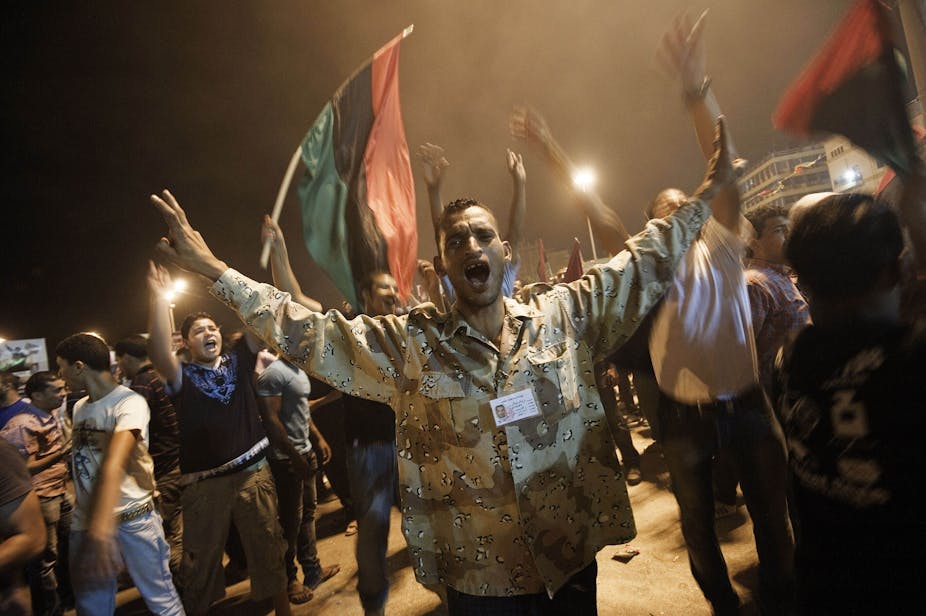The situation in Libya remains fluid but with armed rebel fighters now in Green Square in central Tripoli, it appears the regime of Colonel Muammar Gaddafi is in its final hours.
Two of the dictator’s sons - Muhammad and Saif Al-Islam - have been arrested by rebel forces. There is an International Criminal Court indictment against Saif for ordering war crimes.
The latest reports suggest that rebels from the western city of Misrata launched an amphibious commando operation under cover provided by NATO warships to reinforce those rising against the regime in the capital.
The Conversation spoke with Deakin University Middle East and North Africa expert Mat Hardy about what Libya after Gaddafi might look like.
After the fall of Mubarak in Egypt and Gaddafi, do we now have free and democratic North Africa?
We are seeing a change, I don’t know if we’re seeing total change. Algeria is slackening its grip a little bit but it is still not by any great standards a free and democratic country.
Morocco, although it is a little bit more liberal, still has power very firmly concentrated in the hands of a non-elected head of state.
It remains to be seen what will happen in Egypt. We are seeing a change in the process, but I wouldn’t go so far as to call it a total change yet.
Are there those in the West who might be concerned that any war crimes trial for Gaddafi or his sons and allies might give the deposed dictator the opportunity to air “dirty laundry” about deals done with countries like the USA and UK?
I think there would definitely be a lot of people in Europe and the West who would be hoping Colonel Gaddafi doesn’t come out of this alive just because it would be a simpler and cleaner solution for everybody.
Whether a trial was pursued or not, I think Gaddafi would say all sorts of things. Most of the things Gaddafi says are not all that credible and are always tinged with the status of lunacy that the West ascribes to him.
As far as spilling the beans on any deals done over oil or anything like that, I don’t the West has got a huge amount to fear because nobody ever believes much that Gaddafi says.
I think the real fly in the ointment as far as a trial goes is the very, very slow pace at which those things tend to move in the International Criminal Court (ICC). We see that it can often take years in the ICC with a fairly inconclusive result at the end of it.
I’m not holding my breath that Gaddafi is going to be sentenced to life for war crimes at this stage.
What are the chances that the rebel forces will now turn on each other, similar to the infighting between Afghan Mujahideen after the fall of Kabul in 1992?
I think there is a very high chance that Libya will descend into chaos of some sort. Although we in the West would like to see this portrayed as a very noble thing with Libyans coming together and ousting the dictator I think the chances of it breaking down into tribalism and factionalism are very, very high.
I think it is just human nature that people will want to get revenge on other groups. What is important is that Libya is a very tribal society, much more tribal than say Egypt. Libya doesn’t have that wide band of middle class citizens that Egypt has.
It does really break down into an elite that had control and then everybody else, and everybody else is in tribes.
I think that the chance of those groups turning on each other as everyone makes a grab for power are quite high. There is also a division between the east and the west of the country which never really had much to do with each other. There is the possibility that rivalries there will play out.
There are grave concerns in Europe that the collapse of the Gaddafi regime could see an exodus of refugees across the Mediterranean Sea. Do you think this likely
I would say it is almost a certainty that the refugee movements to Europe will continue and increase. I think Libya will be extremely unsettled for a long while and if those kind of tribal rivalries and revenges do play out then people have got no choice but to move on.
The amount of refugees moving into Europe from North Africa completely diminishes the numbers that we deal with here in Australia.

